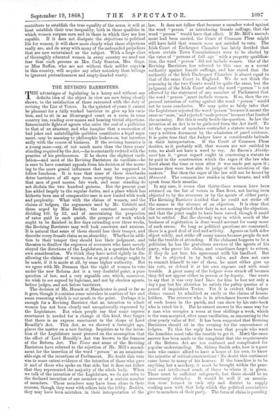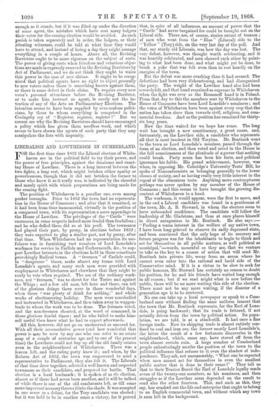THE REVISING BARRISTERS.
THE advantages of legislating in a hurry and without any definite idea of the object in view are now being clearly shown, to the satisfaction of those entrusted with the duty of revising the List of Voters. In the quietest of years it cannot be pleasant for a fully worked barrister to give up his vaca- tion, and to sit in an ill-arranged court or a room in some country inn, reading over names and hearing trivial objections. Interminable fights of agents who unite the zeal of a politician to that of an attorney, and who imagine that a succession of bad jokes and unintelligible quibbles constitutes a legal argu- ment, may be amusing to philosophic lookers-on, but interfere sadly with the course of business. If the revising barrister is a young man—say, of not much more than the three years' standing required by the Act,—he is constantly twitted with the practice of his predecessors. If he shows the slightest vacil- lation—and most of the Revising Barristers do vacillate—he is sure to have constant appeals from his decision of the morn- ing to the more genial influences that may be supposed to follow luncheon. It is true that none of these drawbacks deter barristers of all ages from accepting these posts, and that men of good means, fair work, and some standing do not disdain the two hundred guineas. But the present year has added largely to the regular duties, and a place which has hitherto been one of comparative ease is now loaded with work and perplexity. What with the claims of women, and the claims of lodgers, the arguments used by Mr. Cobbett and those urged by Miss Becker, the constant necessity of dividing 10/. by 52, and of ascertaining the proportion of rates paid in each parish, the prospect of work which ought to be finished in five days extending over three weeks, the Revising Barristers may well look careworn and anxious. It is natural that some of them should lose their temper, and describe every female claim as an absurdity. Whether in addi- tion to their temper they should lose their judgment, and threaten to disallow the expenses of overseers who have merely obeyed the directions of the Legislature, is a question for their own consideration. We think they have acted rightly in dis- allowing the claims of women, for so great a change ought to be made, if it is made at all, by some higher authority. But we agree with Mr. Denman that the right of women to vote under the new Reform Act is a very doubtful point, a pure question of law, and a very arguable one, which, moreover, we wish to see argued by logicians, and not by election agents, before judges, and not before banisters.
The decision of Mr. Hosack at Manchester is good so far as it goes, though it contains some mistakes in matters of law and some reasoning which is not much to the point. Perhaps it is enough for a Revising Barrister that an intention to admit women has not been clearly and unequivocally expressed by the Legislature. But when people say that some express enactment is needed for a change of this kind, they forget that there is an express enactment in the shape of Lord Romilly's Act. This Act, as we showed a fortnight ago, places the matter on a new footing. Inquiries as to the inten- tion of the Legislature must proceed on the assumption that the effect of Lord Romilly's Act was known to the framers of the Reform Act. The Times and some of the Revising Barristers have referred to the rejection of Mr. Mill's amend- ment for the insertion of the word "person" as an unmistak- able sign of the intentions of Parliament. No doubt this vote was to some extent evidence of the intention of those who gave it and of those who spoke on that side, but it does not follow that they represented the majority of the whole body. When we talk of the intention of the Legislature, we do not refer to the declared intention of one member or of a certain number of members. Those members may have been alone in their reasons, though they went with others into the lobby. Besides, they may have been mistaken in their interpretation of the law. It does not follow that because a member voted against the word " person " as introducing female suffrage, that the word " person " would have that effect. If Mr. Mill's amend- ment had been carried, the Court of Common Pleas might still have held that women were not entitled to vote. The Irish Court of Exchequer Chamber has lately decided that where certain Town Commissioners were to be elected by the votes of "persons of full age with a property qualifica- tion, the word person" did not include women. One of the Revising Barristers has referred to this case as a recent authority against female suffrage, and has stated that the authority of the Irish Exchequer Chamber is almost equal to that of the same Court in England. We do not think the reasoning in the two Courts would be quite the same, but the judgment of the Irish Court about the word "person" is not affected by the statement of any member of Parliament that the word "person ".must include women. If so, then the ex- pressed intention of voting against the word "person" would not be more conclusive. We may quite as fairly infer that the Legislature rejected the word "person" because it meant the same as "man," and rejected "male person" because that limited the meaning. But this is really beside the question. In law the intention of an Act is to be gathered from the Act itself. To let the speeches of members contradict a statute would be to vary a written document by the admission of parol evidence. It is quite true that the Judges have a considerable latitude in their interpretation. If the Court of Common Pleas decides, as it probably will, that women are not entitled to vote, we shall not have a word to say. As Bacon's Abridg- ment has it, "great regard ought in construing a statute to be paid to the construction which the sages of the law who lived about the time or soon after it was made put upon it ;. because they were best able to judge of the intention of the makers." But then the sages of the law will not be bound by Hansard. The common law resides in their breasts, and will' speak from their mouths. In any case, it seems that thirty-three women have been retained on the list of voters in East Kent, not having been objected to by the overseers or by the agents of either party. The Revising Barrister decided that he could not strike off the names in the absence of an objection. It is clear that the overseers neglected their duty in not making the objection, and that the point ought to have been raised, though it could not be settled. But the slovenly way in which much of the business of registration is done would account for many more of such errors. So long as political questions are concerned, there is a good deal of zeal and activity. Agents on both sides object wildly. and strike off many names because people do not take the trouble of attending. If the claimant happens to be a politician he has the gratuitous services of the agents of his party, who prove his claim, and sometimes forget to return, if they do not lose, his agreement with his landlord. But if he is objected to by both sides, and does not care to commit himself to one of them, he must either give up his vote, or defend it at his own expense and with some trouble. A great many of the lodgers were struck off because they did not appear either in person or by deputy. One wrote to say that it was very hard lines for him to lose not only a day's pay but his situation to satisfy the paltry queries of a parcel of inquisitive Tories. Yet it is evident that lodger claims cannot be admitted as easily as the claims of house- holders. The overseer who is in attendance knows the value of each house in the parish, and can show by his rate-book who is rated for it. But he cannot answer in the same way for a man who occupies a room at four shillings a week, which is the sum accepted, after some vacillation, as amounting to the clear yearly value of 10/. It has been suggested that Revising Barristers should sit in the evening for the convenience of
lodgers. To this the reply has been that people who want the franchise must take the trouble to get it. Muth the same answer has been made to the complaint that the requirements of the Reform Act are too confused and complicated for popular understanding. Mr. Sidney Smith asks, how is a poor man who cannot afford to have a house of his own, to know the minutiw of critical constructions ? No doubt this sentiment came home to many of his hearers. If the franchise is to be anything but a mockery, it must be brought within the prac- tical and intellectual reach of those to whom it is given. There must be sufficient safeguards, but there should be no unnecessary obstacles. It would be well if an associa- tion were formed in each city and district to supply working men with that help which the political associations give to members of their party. The form of claim is puzzling
-enough as it stands, but if it was filled up under the direction of some agent, the mistakes which have cost many lodgers their votes for the coming election would be avoided. As each parish is taken separately and in order, the lodgers, or their attesting witnesses, could be told at what time they would have to attend, and instead of losing a day they might manage everything in a couple of hours. Above all, the Revising Barristers ought to be more vigorous on the subject of costs. The power of giving costs when frivolous and vexatious objec- tions are made is expressly reserved to the Revising Barristers by Act of Parliament, and we do not think they ought to waive this power in the case of new claims. It ought to be recog- nized that political agents have no right to object generally to new voters unless there is something known against them, or there is some defect in their claim. To require every new voter's personal attendance before the Revising Barrister, or to make him instruct an agent, is surely not the in- tention of any of the Acts on Parliamentary Elections. The intention seems to have been supplied by over-zealous politi- cians, by those to whom everything is comprised in the Coningsby cry of "Register, register, register !" But we cannot see why the Revising Barristers should have encouraged a policy which has given them needless work, and which seems to have shown the agents of each party that they may manipulate the lists with impunity.































 Previous page
Previous page